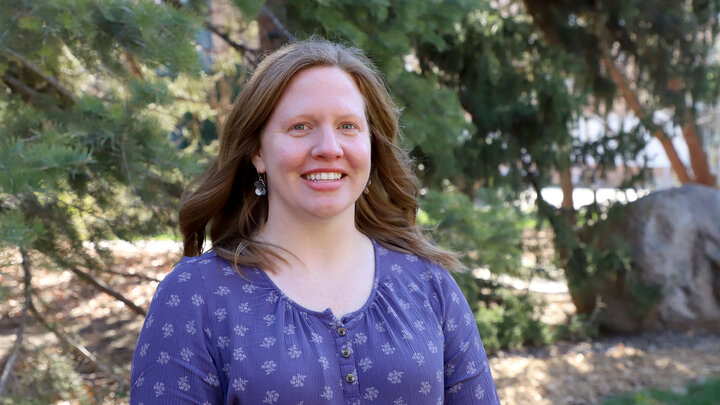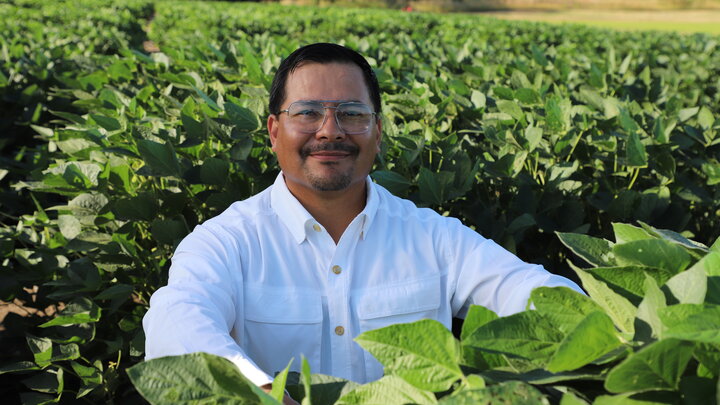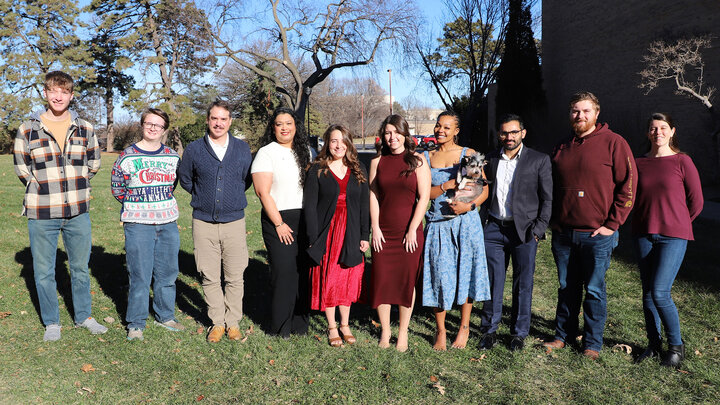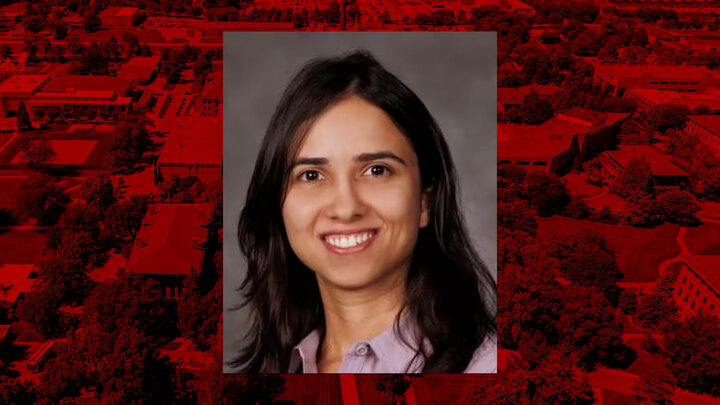Becky Young, assistant professor of practice in agronomy and horticulture, was honored with a Holling Family Early Achievement Faculty Award at the CASNR Awards Luncheon May 6 at the Nebraska East Union.
This award recognizes exceptional teaching by early career faculty. The award was one of nine Holling Family Awards for Teaching Excellence given to the Institute of Agriculture and Natural Resources senior faculty, junior faculty and teaching assistants this year.
Young earned both a Master of Science and doctoral degrees in natural resource science from the University of Nebraska-Lincoln. She joined the Department of Agronomy and Horticulture in 2018 as an assistant professor of practice in soil science.
Young has lectured at the University of Nebraska–Lincoln since earning her doctorate in 2015. First, within the School of Natural Resources for the Soil Evaluation and Great Plains Field Pedology courses and in the Program of Geography for the Elements of Physical Geography and Geography Field Tour courses.
With a 100% teaching appointment, she currently teaches resident and online Plant and Landscape Systems/Soil 153 Soil Resources, Natural Resources/Plant and Landscape Systems/Soil 279 Soil Evaluation and 379 Advanced Soil Evaluation courses. Young has also trained and mentored over 20 graduate and undergraduate teaching assistants for her classes.
“Becky created an organized, inviting and collaborative classroom environment,” Callie McCright, Nebraska alumna and former teaching assistant said. “I trace my love of soil science, later involvement in the soil judging team, and career aspirations to the positive and motivating experience in Becky’s Soil Resources course. As her TA, I could see her commitment to her students behind the scenes.”
Her teaching interests involve teaching methods, developing learning tools, and soils and geomorphology.
Meghan Sindelar, associate professor in agronomy and horticulture, said she noticed growth and improvement in the course after Young joined the Soil Resources team of instructors.
“Becky continuously innovates her teaching approach,” Sindelar said. “She has been an outstanding educator who understands that engagement increases learning. As learning spaces returned to full capacity in Fall 2021, Becky encouraged the Soil Resources teaching team to utilize the new teaching techniques we had been developing and expand our teaching in new ways,” Sindelar said.
Young led efforts to update and publish new versions of the laboratory manual for Soil Resources. Most importantly, she has shared her teaching success through the publication of pedagogical research, citing four peer-reviewed journal articles from her time at Nebraska.
“Many innovations have also occurred in the online sections of Soil Resources, where Becky is the sole instructor,” Sindelar said. “Most notably, she remodeled the previously fully independent course to increase students’ interactions with herself and each other.”
She has been coaching the Soil Judging Team since 2014. In March, she helped co-lead a group of University of Nebraska–Lincoln students to Puerto Rico for an International Study Tour in Natural Resource Management over Spring Break. In addition, she has contributed to the Nebraska Master Gardener course and co-leads the Nebraska Soil Summer Institute workshops for high school teachers.
In addition to regular attendance at the CASNR teaching workshops, she also participates in the Peer Review of Teaching program through the university to develop new ideas for the online version of Soil Resources.
Agronomy and Horticulture Department Head Martha Mamo (from left), Becky Young and Judith Turk help Young celebrate the Holling Family Early Achievement Faculty Award she was honored with at the CASNR Awards Luncheon.
“Becky is passionate about getting her students out in the field to gain hands-on experience,” Judith Turk, a Conservation and Survey Division pedologist, said. “Becky clearly understands that the work she puts into creating field experiences has a big payoff in terms of their impact on students.”
One project she is wrapping up this summer is a manuscript with Turk on a project they did with students from the University of Nebraska–Lincoln and other universities at the Region 5 Soil Judging Contest of Fall 2021.
“I designed an activity called Jumble Judging where students would work in small groups with a mix of students from the other universities to describe and interpret soil pits during the contest week,” Young said.
The project’s goal was to provide an opportunity for students to network, practice problem-solving, collaborate with more diverse teams and backgrounds, and promote community and a sense of belonging in the broader soil judging community.
“We assessed attitudes and learning gains from the students through surveys and reflection activities,” Young said. “Overall, responses from students and coaches were positive, with relatively strong agreement that they would like to continue including the activity in future contests, that it was one of the best parts of the contest week and that the students learned something new through the activity.”
This coming academic year, the Soil Resources class will conduct semester-long soil investigation projects on soil cores collected from Reller Prairie near Sprague, Nebraska. With this new site, the students will see a large variety of soils and historical management practices in a relatively small area — 80 acres.
“We are also, for the first time, incorporating a field trip into the course to take students out to the site for more immersive, field-based experiential learning,” she said.
Young said her two favorite things about working at the University of Nebraska–Lincoln is having a wide variety of people from different backgrounds with different specializations and perspectives within one department that she can quickly and effectively collaborate in teaching, mentoring and during research projects. The second is having a vast network of field stations, research centers and test sites within just an hour of campus.
“I appreciate having site managers who are always willing to let me take soil cores or sometimes put a big hole in the ground to help teach my students about soil science,” Young said.
The Holling Family Award Program for Teaching Excellence was made possible by a gift from the Holling family to honor their pioneer parents. John Holling was a 1912 electrical engineering graduate of the University of Nebraska–Lincoln. His brother, Gustave Holling, attended the College of Agriculture before farming the family’s land in the Wood River Area of Nebraska.




